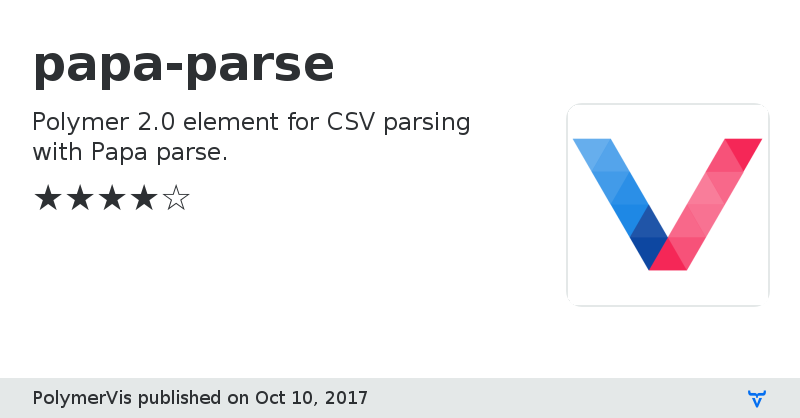papa-parse - Vaadin Add-on Directory
Polymer 2.0 element for CSV parsing with Papa parse.
**[ This description is mirrored from README.md at [github.com/PolymerVis/papa-parse](https://github.com//PolymerVis/papa-parse/blob/2.0.1/README.md) on 2019-05-10 ]**
papa-parse
[](https://github.com/PolymerVis/papa-parse/releases)
[](https://www.webcomponents.org/element/PolymerVis/papa-parse)
[](https://github.com/prettier/prettier)
==========
```html
GitHub HomepageParsed CSV table:
| [[item]] |
Csv string
[[csvStr]]``` ## Installation ``` bower install --save PolymerVis/papa-parse ``` ## Documentation and demos More details @ [webcomponents.org](https://www.webcomponents.org/element/PolymerVis/papa-parse). ## Disclaimers PolymerVis is a personal project and is NOT in any way affliated with Papaparse, Polymer or Google. # papa-parse `papa-parse` is a Polymer 2.0 element to parse CSV files into JSON object(s) with [Papa parse](http://papaparse.com/). `papa-parse` can download and parse a csv file via `url`, or from raw csv strings via `raw`, and File object via `file`. If the `auto` flag is set, `papa-parse` will automatically start the job, otherwise a manual call to the function `start` will be needed. Parse from URL. ```html
Issue tracker
Online Demo
License
Documentation
View on GitHub
papa-parse version 2.0.0
### Dependencies
Polymer/polymer#^2.0.0
* papaparse#^4.3.6
papa-parse version 2.0.1
### Dependencies
Polymer/polymer#^2.0.0
* papaparse#^4.3.6